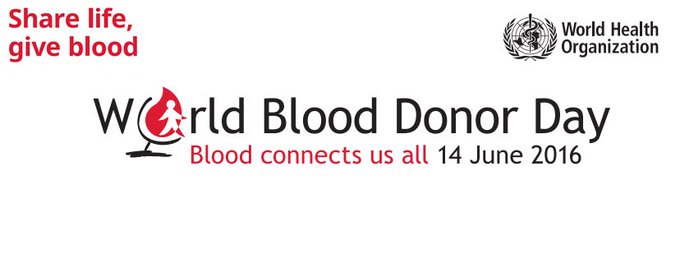The World Health Organization’s Africa region on the occasion of ‘World Blood Donor Day’ has disclosed that the continent is able to cater for only around half of its annual requirement of blood despite demand in the region being high.
In a message to commemorate the day, the WHO Regional Director for Africa, Dr Matshidiso Moeti said even though voluntary blood donations have increased between 2013 – 2016, it was still insufficient for the continents need.
‘‘From 2013 to 2016, blood donations rose from about 3.9 million units to 4.4 million units. That is 11.4 percent of increase, but this will still cover only around 50 percent of the annual requirement of blood. So far, only 21 countries are collecting 80 to 100 percent of their national blood needs through voluntary unpaid blood donors,’‘ the message read.
From 2013 to 2016, blood donations rose from about 3.9 million units to 4.4 million units. That is 11.4 percent of increase, but this will still cover only around 50 percent of the annual requirement of blood.
.@WHOAFRO thanks all voluntary unpaid blood donors for this selfless act of giving life #WorldBloodDonorDaypic.twitter.com/ICBypfOpfc
Demand for transfusion of blood & blood products is high in African Region, donations only cover around 50% of needsgoo.gl/pQ9k9V
It further bemoaned the difficult task that national blood transfusion services are facing in their efforts to make sufficient, safe and quality blood and blood products available.
The commemoration under the theme; ‘‘Blood connects us all,’‘ sought to highlight the dimension of sharing and connection between blood donors and patients and to thank voluntary, unpaid blood donors for their life-saving gifts of blood.
According to the WHO, ‘‘Blood transfusion has an essential life-saving role in all aspects of health care including maternal and child care, particularly in cases of haemorrhage during or after childbirth, severe anaemia; for victims of trauma and accidents; and in the event of man-made and natural disasters. It also supports complex medical and surgical procedures in health care, among others.’‘
Blood transfusions helps save millions of lives every year:
-During emergencies
-Conflict
-Natural disasters
-Childbirth#GiveBlood
Today is #WorldBloodDonorDay!
Share life, #GiveBlood.
10 facts on blood transfusion: goo.gl/dOA3i7pic.twitter.com/dOvyhANN3l
The global health body also blamed the shortage of blood in most African countries on the weak implementation of policies, and lack of systems and structures to ensure an adequate supply of safe blood and blood products to meet the needs of all patients requiring transfusion.
‘‘In addition, most young people and adults have not yet embraced the culture of voluntarism when it comes to blood donation,’‘ WHO added.
DONT HESITATE TO JOIN OUR FACEBOOK PAGE BELOW FOR MORE BREAKING AND HOT RESEARCHED NEWS











0 comments:
Post a Comment